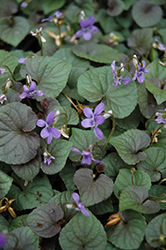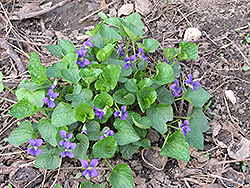Height: 4 inches
Spacing: 6 inches
Sunlight:
![]()
![]()
Hardiness Zone: 6a
Other Names: Sweet Violet
Description:
A beautiful clump forming violet with fragrant elegant blue flowers that creates a dramatic display in the garden or containers; the leaves and flowers are edible, the leaves being used in salads or cooked; roots are used to make a laxative tea
Ornamental Features
Wood Violet has masses of beautiful fragrant blue flowers with white eyes at the ends of the stems from late winter to early spring, which are most effective when planted in groupings. Its serrated heart-shaped leaves emerge light green in spring, turning dark green in color throughout the season.
Landscape Attributes
Wood Violet is an herbaceous perennial with a mounded form. Its relatively fine texture sets it apart from other garden plants with less refined foliage.
This plant will require occasional maintenance and upkeep, and should only be pruned after flowering to avoid removing any of the current season's flowers. Deer don't particularly care for this plant and will usually leave it alone in favor of tastier treats. Gardeners should be aware of the following characteristic(s) that may warrant special consideration;
- Self-Seeding
Wood Violet is recommended for the following landscape applications;
- Mass Planting
- Border Edging
- General Garden Use
- Herb Gardens
- Container Planting
Planting & Growing
Wood Violet will grow to be only 4 inches tall at maturity, with a spread of 8 inches. When grown in masses or used as a bedding plant, individual plants should be spaced approximately 6 inches apart. Its foliage tends to remain low and dense right to the ground. It grows at a fast rate, and tends to be biennial, meaning that it puts on vegetative growth the first year, flowers the second, and then dies. However, this species tends to self-seed and will thereby endure for years in the garden if allowed. As an herbaceous perennial, this plant will usually die back to the crown each winter, and will regrow from the base each spring. Be careful not to disturb the crown in late winter when it may not be readily seen!
This plant does best in partial shade to shade. It prefers to grow in average to moist conditions, and shouldn't be allowed to dry out. It is not particular as to soil type or pH. It is highly tolerant of urban pollution and will even thrive in inner city environments. Consider covering it with a thick layer of mulch in winter to protect it in exposed locations or colder microclimates. This species is not originally from North America.
Wood Violet is a fine choice for the garden, but it is also a good selection for planting in outdoor pots and containers. It is often used as a 'filler' in the 'spiller-thriller-filler' container combination, providing a mass of flowers against which the thriller plants stand out. Note that when growing plants in outdoor containers and baskets, they may require more frequent waterings than they would in the yard or garden. Be aware that in our climate, this plant may be too tender to survive the winter if left outdoors in a container. Contact our experts for more information on how to protect it over the winter months.


